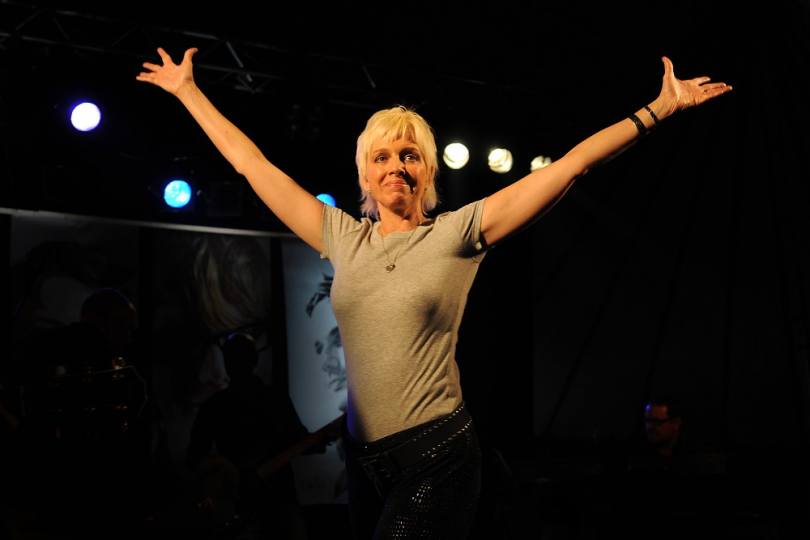
Ellen Foley: “I Was No Punk Kid, but 1970s New York Was Exciting to Me”
Ellen Foley was born in St. Louis, moved to New York at a young age, and found her fortune as an actress on Broadway. She starred in both the stage and film versions of the musical Hair, and shone when she recorded the duet "Paradise By The Dashboard Light" with Meat Loaf in 1977. A solo career was soon to follow—she recorded three albums, collaborating with rock greats Ian Hunter, Mick Ronson, and twosome Joe Strummer and Mick Jones of The Clash. In the second half of the 1980s, she took a break from music to devote herself to film and theatre. She only recently got back in the game through a musical partnership with composer Paul Foglin, with whom she released the album About Time in 2013. This August, the singer with the distinctive voice will release a new collection of eleven songs titled Fighting Words.
The first single from your new album Fighting Words, "I'm Just Happy To Be Here," is a duet with Karla DeVito. Your careers have intersected several times in the past. You met in composer and playwright Jim Steinman's musical Neverland, and it was Karla who replaced you on tour with Meat Loaf after you recorded the legendary Bat Out Of Hell album with him. Who came up with the idea for the duet?
It was my suggestion. Since Karla started singing with Meat Loaf, we haven't seen each other much. We had a nice reunion at a concert in New York honoring the music of Jim Steinman. We hit it off, we've had similar experiences ,and we definitely have a connection. I like her a lot, I like her voice, so I told Paul [Foglin] I wanted to record with her. I thought it could be a song about two people who have a conflict with each other, delivered with some humor, but Paul wasn't really into it and instead came up with this song, which I think is perfect. It fits the times.
Jim Steinman left us in April of this year. Was that why you chose to include his song "Heaven Can Wait," which also appeared on Meat Loaf's debut, at the end of the album?
No, the record was already finished at that time. I've been singing "Heaven Can Wait" in concert since I was in his musical Neverland, which you mentioned. I think it was 1977. But the recording of my version was originally for an independent film called Lies I Told My Little Sister, about nine years ago. Jim gave us the rights and permission to use it. It's an important song to me, and it has even more meaning now that Jim has passed away.
Another loss was the death of your guitarist Stephen Antonakos, who tragically succumbed to Covid in 2020.
This was a real shock. I didn't know many people in my area who had died from Covid. You think about it in the abstract—and then, suddenly someone you know dies of it. Huge tragedy.
As on the previous record, Paul Foglin wrote the songs for you. How did you two first meet and when exactly did your collaboration begin?
In 2008, I played in a show that a friend of mine wrote and that Paul had written the music and lyrics for. After the show opened, we agreed that we wanted to continue working together. Originally, we were just going to be a cover band playing Rolling Stones songs, which was always my dream. (laughs) But as we spent more time together, Paul said: "I'm a songwriter, why don't I just write some songs?" We had a band, we played around town, and it just kind of organically grew into a situation where we were able to put together enough material to make our own record.
How does your cooperation work? Paul seems to know what suits you, how to write songs for you. Do you give him any instructions on what you want the song to sound like, or do you leave it entirely up to him?
We spend a lot of time together, we have a lot of fun, he knows my voice, my sense of humor, the dramatic elements that I bring to it. There's some collaboration in that sense, but all of the songwriting is entirely done by him.
So he writes the music and then you work on the vocals together?
Paul also writes the vocal melodies. But he doesn't have the ego to make you sing it exactly the way he wrote it, down to the note. He leaves room for people to play with it in their own way.
It's a rock album. The songs "I'll Be True" or "This Won't Last Forever" have a Stones vibe to them. You're a big Rolling Stones fan yourself, right?
Yes, now and forever! The guitar riffs in those two songs are very Stones-y, that's true, but I don't mind it. That's the work of our guitarist Slim Simon, he came up with it. You know, someone writes music, hands it over to the band, and then some interesting arrangements are made.
On your first solo album Night Out you covered their song "Stupid Girl."
Yes, that's right!
On that album you collaborated with other equally interesting musicians, namely Ian Hunter and guitarist Mick Ronson.
That was a great experience. Through Meat Loaf I met a wonderful man called Steve Popovich, who was the owner of Cleveland International Records and became my manager. He was a visionary, he was the only one who understood Meat Loaf. Other record companies thought his music was too crazy, weird, loud—but Popovich loved it, because music was what he cared about most in life. Anyway, he was the one who put me together with Ian and Mick. It was my second experience ever in a recording studio; the first time had been with Meat Loaf. Having these great English rockers as mentors, being taken to completely new places in life and in music, was really exciting and inspiring.
Meat Loaf's debut was your first ever record and it was immediately a record that sold 50 million copies. Did you realise during the recording process that you were part of something that big?
I didn't know it was going to be this huge, but I did realize that I was part of something amazing. Nobody expected that it would sell so many records, because musically it was completely different from what was being done at the time.
Another important collaboration was with The Clash. You recorded with them for the album Sandinista and you appear in one song on the next album, Combat Rock, as well. At that time, The Clash were your backing band and they helped with the songwriting for your second solo album Spirit Of St. Louis. I think it's a great album, maybe sometimes unfairly overlooked.
It's great that you and I can talk, because I have no idea how well-known I am in your country. If my new record manages to get some media attention, then the Spirit Of St. Louis album might get some exposure as well, which would be nice.
You were born in St. Louis?
Yes, I was. Also, Charles Lindbergh—the first person to fly across the Atlantic—named his airplane Spirit Of St. Louis. That was one of the inspirations for the title of my album. I was also from St. Louis, and I was in London, on the other side of the Atlantic.
Why did you decide to leave St. Louis for New York when you were young?
I moved to New York in 1972, the day I turned 21. I went to college for two years and decided I wanted to give New York a try. I had a band in St. Louis with my then-boyfriend, and we had a band here in New York, but in the meantime I was studying acting and looking for a job in theater. I was getting a lot of offers as an actress and our band didn't last that long. Television, movies, and performing on Broadway were my main focus, and the music went by the wayside. Until I met Jim Steinman with Meat Loaf and my rock 'n' roll career began.
New York was a pretty dangerous place in the '70s.
Supposedly, but I loved it. It was so exciting, there was so much energy everywhere. Everything was coming out of New York at that time. The punk scene didn't start in London, it started here, even though I wasn't really a punk kid. Yeah, the city might have seemed greedy, dirty, but it didn't feel like that to me. I was going through a big life change and I loved everything around me.
What came first for you, an interest in music or theater/film?
Probably theatre—I wanted to be a Broadway actress, which I eventually became. I did three plays on Broadway. The best one I was in was Stephen Sondheim's Into The Woods. I worked with two geniuses in my life, one was Jim Steinman and the other was Sondheim, so I'm a lucky girl. [laughs]

You also performed on Broadway in the musical Hair and even appeared in the film version, which was directed by Czech-born Miloš Forman. What are your memories of shooting with Forman?
He was a very special person. . . . You never knew when he was working because he was always having a great time.
Were you satisfied with the result?
Yeah. In the film, I sing the song "Black Boys," and shooting that was one of the best days of my life. Miloš was there, and Twyla Tharp did the choreography. She's another genius I've had the opportunity to work with. We had a lot of fun.
The beginning of the 80s must have been quite a hectic period for you—you made records, starred in films and TV series such as Night Court (1984-1992), Tootsie (1982), Fatal Attraction (1987), and Cocktail (1988).
The Night Court series was filmed after I had three albums under my belt and wanted to get back into acting. Yes, the whole seventies and basically the eighties were incredible, I love to reminisce about them.
Was lack of time also one of the reasons why you pauzed your music career for a while?
I had a three-album contract. The first, Night Out, did very well; then came Spirit Of St. Louis, which was a bit more difficult because people expected something different, and then came the third record. You're on the road all the time, you've got bands, you've got to be the manager of the whole thing. And I thought: you know, now I just want to be an employee again for a while. And that's pretty much how it was until I met Paul Foglin. In 1989, I got married and had two kids and really didn't want to work. A few years later, we met, recorded our first album together, and started touring.
If you have found an error or typo in the article, please let us know by e-mail info@insounder.org.

